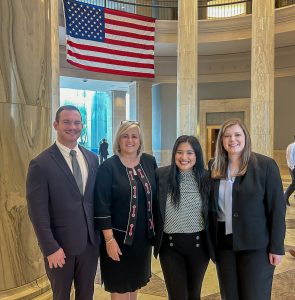
Named with permission of the estate of Nelle Harper Lee, the Finch Initiative launched in 2017 in the town of Andalusia, Alabama, under the guidance of Circuit Judge Ben Bowden (Class of 1992) of the 22nd Judicial Circuit of Alabama in Covington County. The program provides rising 2L or 3L students — designated as Finch Fellows — an opportunity to spend six to eight weeks during the summer as judicial interns in communities in rural Alabama. While many students who attend law school are attracted to Big Law in major cities, other students are interested in exploring the possibility of pursuing fulfilling professional lives in small-town practice. Under the direction of a circuit judge, Finch Fellows gain experience in a range of settings such as Circuit, District, and Probate Courts as well as the local District Attorney’s Office. Many of the Fellows also shadow local attorneys to better understand what it is like to practice law in rural communities.
After the Initiative’s initial success in Covington County, Alabama Law extended the program to include three additional circuits: the 24th Judicial Circuit in Pickens, Lamar, and Fayette Counties with Judge Sam Junkin (Class of 2000); the 38th Judicial Circuit in Jackson County with Judge John Graham (Class of 1991); and the 3rd Judicial Circuit in Bullock and Barbour Counties with Judge Burt Smithart (Class of 1989). This summer, Austin Bowling (Class of 2026) clerked with Judge Junkin, Loren Reese (Class of 2026) clerked with Judge Graham, and Natalie Walls (Class of 2026) clerked with Judge Smithart.
“My biggest takeaway from this experience is that people in rural Alabama deserve good lawyers that will advocate for their clients,” said Reese. “When you are a small town lawyer, you’re a jack-of-all-trades. You will likely be doing multiple types of law, and the people of the community are counting on you to know what you are doing. There needs to be lawyers in rural places whose hearts are set on helping people when they need it the most.”
According to the Alabama Department of Public Health, 43% of people in Alabama live in rural areas. Matching a pattern that can be found throughout the U.S., there is an underrepresentation of lawyers within the small-town communities across Alabama. The Finch Initiative plays a critical role in effectively training students who are interested in serving within rural communities throughout the state.
“So many small towns are in needs of young, vibrant men and women who can be leaders in their community and this Initiative shows the community that the University cares. [The Finch Initiative] strengthens Alabama Law by opening the eyes of smart lawyers who might not otherwise consider practicing law in a small town,” said Judge Junkin. “Small towns have just as many issues as larger urban areas, albeit on a smaller scale, but there is just as great a need for quality legal representation in rural areas as in urban. Exposing young lawyers to rural areas hopefully leads to these lawyers choosing to practice law in small towns, which increases the quality of representation in those areas.”
Through additional support of alumni and friends, we hope to continue to grow this meaningful program to give more students opportunities to work in rural communities throughout the state. The Law School is appreciative of the leadership of judges and other members of communities who have made the Finch Initiative possible.